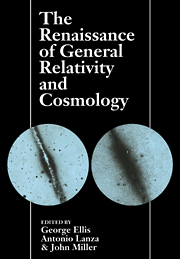 The Renaissance of General Relativity and Cosmology
The Renaissance of General Relativity and Cosmology Book contents
- Frontmatter
- Contents
- Author Addresses
- 1 Introduction
- 2 Exact and inexact solutions of the Einstein field equations
- 3 Inertial forces in general relativity
- 4 Relativistic radiation hydrodynamics: a covariant theory of flux-limiters
- 5 Relativistic gravitational collapse
- 6 The cosmic censorship hypothesis
- 7 The Kerr metric: a gateway to the roots of gravity?
- 8 Galactic astronomy since 1950
- 9 Galaxy distribution functions
- 10 Nonlinear galaxy clustering
- 11 Quasars: progress and prospects
- 12 Decaying neutrinos in astronomy and cosmology
- 13 Cosmological principles
- 14 Anisotropic and inhomogeneous cosmologies
- 15 Mach's principle and isotropic singularities
- 16 Implications of superconductivity in cosmic string theory
- 17 The formation and evaporation of primordial black holes
- 18 Evaporation of two dimensional black holes
- 19 Topology and topology change in general relativity
- 20 Decoherence of the cluttered quantum vacuum
- 21 Quantum non-locality and complex reality
- 22 The different levels of connections between science and objective reality
16 - Implications of superconductivity in cosmic string theory
Published online by Cambridge University Press: 15 December 2009
- Frontmatter
- Contents
- Author Addresses
- 1 Introduction
- 2 Exact and inexact solutions of the Einstein field equations
- 3 Inertial forces in general relativity
- 4 Relativistic radiation hydrodynamics: a covariant theory of flux-limiters
- 5 Relativistic gravitational collapse
- 6 The cosmic censorship hypothesis
- 7 The Kerr metric: a gateway to the roots of gravity?
- 8 Galactic astronomy since 1950
- 9 Galaxy distribution functions
- 10 Nonlinear galaxy clustering
- 11 Quasars: progress and prospects
- 12 Decaying neutrinos in astronomy and cosmology
- 13 Cosmological principles
- 14 Anisotropic and inhomogeneous cosmologies
- 15 Mach's principle and isotropic singularities
- 16 Implications of superconductivity in cosmic string theory
- 17 The formation and evaporation of primordial black holes
- 18 Evaporation of two dimensional black holes
- 19 Topology and topology change in general relativity
- 20 Decoherence of the cluttered quantum vacuum
- 21 Quantum non-locality and complex reality
- 22 The different levels of connections between science and objective reality
Summary
Although Kibble's original toy cosmic string model is characterised by longitudinal Lorentz invariance, it is argued that the tacit assumption that this feature would be preserved in a realistic treatment is rather naive. Strict longitudinal Lorentz invariance is incompatible with equilibrium, but its violation allows closed string loops to survive in centrifugally supported states instead of radiating all their energy away. Following the explicit suggestion by Witten of a superconductivity mechanism whereby such a violation would be achieved, it was pointed out by Davis and Shellard that although the ensuing distribution of centrifugally supported string loops would be cosmologically admissible in a “lightweight” (electroweak transition) string scenario, it would imply a highly excessive cosmological mass density ratio, Ω ≫ 1 in a “heavyweight” (G.U.T. transition) string scenario of the kind postulated to account for galaxy formation. In order to salvage such scenarios, it might be hoped that Witten type superconductivity does not occur, except perhaps as an ephemeral phenomenon subject to decay by quantum tunnelling. However such optimism overlooks the point that the Witten mechanism is just one particularly simple example, and that even if it fails to apply, experience shows that there are many other ways by which Lorentz symmetry breaking in extended material systems is usually achieved.
Information
- Type
- Chapter
- Information
- The Renaissance of General Relativity and CosmologyA Survey to Celebrate the 65th Birthday of Dennis Sciama, pp. 248 - 257Publisher: Cambridge University PressPrint publication year: 1993